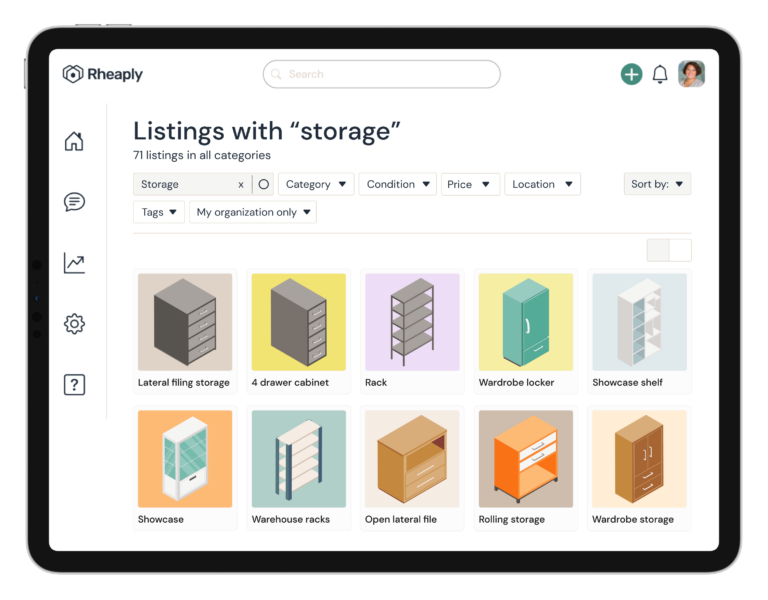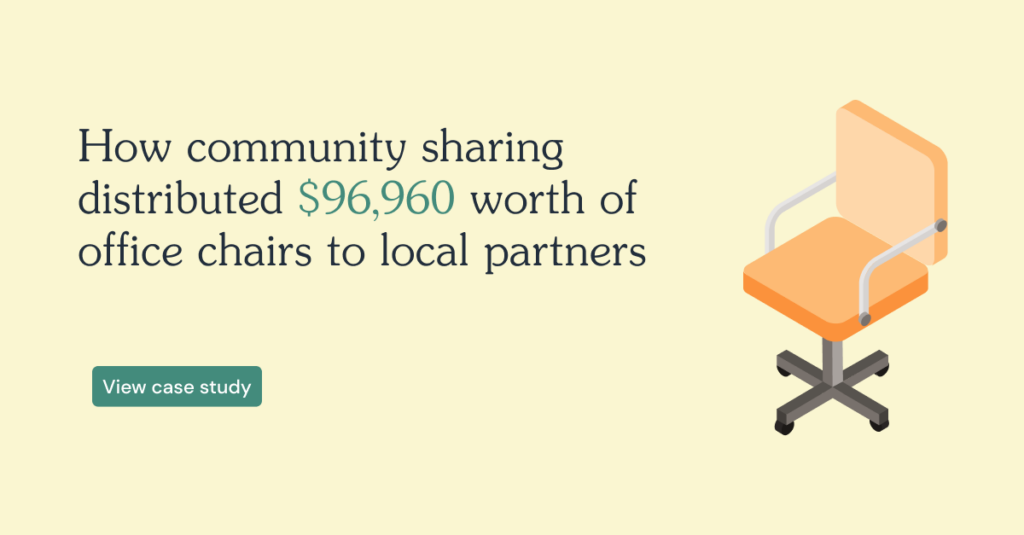Environmental Sustainability Consulting Firms
Rheaply puts reuse on the table for every organization.
Environmental Sustainability Consulting Firms
In recent years, many have increasingly turned their attention to the environmental impact of businesses and sustainability economics. Large companies, which heavily influence supply chains and the way other smaller organizations around them might act, can have a massive impact on the environment.
Now, many companies have turned their focus to environmental sustainability and seek to improve their business practices in order to minimize or improve their environmental impacts. Improving the environmental impacts of a business can be a highly complex matter, however.
Organizations might seek out experts who are well-suited to help the organization make changes to the way it operates in order to become more environmentally sustainable. These experts are very often sustainability consultants.
Sustainability consulting firms can take many focuses as they help businesses navigate sustainability efforts and implement their own sustainable practices. However, sustainability is a broad term that encompasses many efforts to create a more equitable and sustainable world for those who come after us. Sustainability consultants might focus on matters such as social impact as well as the environmental impact of organizations.
Environmental sustainability consulting firms might take a more focused approach that seeks to best help organizations create and maintain sustainable practices which aim to improve their environmental impact. Finding the best environmental consulting firms may seem like a challenge, but organizations must simply ensure that the services offered by a potential consulting firm match up with the organization’s needs.
Environmental sustainability consulting firms can help organizations better understand their own current environmental impacts through assessments and audits used to determine the extent of possible environmental impact. This type of data might take the form of a carbon footprint analysis or environmental impact analysis. Using this data, organizations can take steps to minimize or improve their impact on the environment.
Environmental sustainability consulting firms also might help organizations act on the information they provide and help with environment development and sustainability efforts. For example, an environmental sustainability consulting firm might help an organization create a strategy to reduce their carbon footprint or help develop green initiatives designed to create smarter and less destructive business practices.
While sustainability consulting firms can help businesses with a range of sustainability efforts, environmental sustainability consulting firms have a specific focus on environmental sustainability, making them well-equipped to help organizations improve their environmental impact. For many organizations, this is an important role.
Sustainability consulting services
Sustainability consulting firms offer a wide range of consulting services to their clients which generally aim to help improve sustainability. Yet, sustainability is a wide-ranging effort that takes into account many types of impacts. Many consulting firms, as a result, take a broad focus on sustainability. These firms might be referred to as ESG consulting firms–ESG stands for Environmental, Social, and Governance. These are sometimes called the three pillars of sustainability.
While environmental deals with the impacts our practices have on our planet and ecosystem, social deals with the impacts on society, and governance deals with organizations’ abilities to self-govern—for example, being transparent about their finances and practices. As such, corporate sustainability consulting might aim to improve operations and outcomes in any and all of these three distinct areas. There may also be overlap between these areas; for example, consider an organization that aims to pollute less, especially in low-income areas, where residents might be less equipped to deal with health hazards and legal turmoil.
Sustainability consulting firms also operate in various roles and offer varying services which enable them to help organizations improve their sustainability efforts. Some might offer insights–data from environmental impact assessments and carbon footprint analysis, while others might also help organizations take these insights and develop strategies. The end goal is sustainability, and consulting firms can use a wide range of approaches to help their clients realize their goals.
What exactly makes a business’ practices environmentally sustainable? This can be a complex question, and there are many possible answers to it. However, generally, there are a few common goals among many organizations that seek to minimize or improve their environmental impacts. These might be minimizing pollution, ensuring that ecosystems are not disrupted, limiting the number of greenhouse gasses that an organization releases into the atmosphere, and reducing physical waste. While these are noble goals, the matter of reaching them may be a complex matter. Nonetheless, there are some concrete and identifiable actions which can help organizations improve their environmental impact.
- Limiting production of harmful products: While this might apply mostly to manufacturers and others who produce goods, an important consideration is the sustainability of the products that an organization produces. Are they recyclable? Are they made using single-use plastic? Do they pose a risk to the environment if discarded improperly? Are they made using renewable materials?
- Reducing the emission of carbon: Greenhouse gases such as carbon dioxide contribute to global climate change, which poses a serious existential risk to humanity as well as the planet’s ecosystem. Organizations can reduce the emission of carbon by first identifying their carbon footprint and contributing factors, and then making necessary changes to reduce it.
- Reducing waste: Many of us produce massive amounts of waste, which are then sent to landfills. Much of this waste is either non-biodegradable, or degrades poorly and very slowly—making landfills a growing problem with no clear solution. Organizations can work to reduce waste by limiting the amount of un-recyclable goods they use to operate, as well as taking on serious recycling initiatives, and through sustainable procurement wherein items are repurposed rather than discarded.
- Opting for renewable energy when possible: Sustainability aims to create practices which can be sustained for long periods of time. Non-renewable energy stands in square opposition to this ideal. By opting to use renewable energy sources when possible, even organizations that don’t produce energy can shift away from nonrenewable energy.
Sustainable procurement platform
One powerful way that organizations can improve their sustainability in operations is through more sustainable procurement practices. In order to do this, businesses and other organizations might seek to procure goods for their second life, procure recyclable goods in place of non-recyclables, reuse goods internally, and more. In order to do this, organizations might need to find a systematic way to improve the sustainability of their procurement processes.
Sustainability procurement platforms enable organizations to do just that; sustainability procurement platforms help organizations connect with other organizations and exchange goods. Sustainability procurement platforms might serve as a materials exchange platform, enabling organizations to easily find reusable or more environmentally friendly materials. As a surplus marketplace, they can help organizations sell off surplus materials or buy surplus materials, rather than those materials simply remaining unused or worse, going to waste. By using a sustainability exchange, organizations can improve their procurement practices to make them more environmentally friendly and sustainable for the long term.
Though organizations can manually audit their procurement practices and ensure that each part of their procurement process ensures that they use the most sustainable practices possible, this process can be simplified and made much easier through the use of a sustainable procurement platform. With the right sustainable procurement platform, organizations can easily find places to find sustainable goods for procurement, as well as places where unused surplus materials can be sold to others who will find a good use for them. The goal of these platforms is to sufficiently streamline and simplify sustainable procurement for widespread adoption, which can have positive impacts that spread far beyond the organization over time.

Sustainability criteria in a procurement policy
Practicing sustainable procurement is a great aspiration. However, how does your organization define sustainable procurement? What types of criteria might you attach to procurement policies which can lead to overall more sustainable practices?
Just as it can be important to have clear standard operating procedures in many other parts of a business or other organization, it’s important to clearly outline expectations and standardize operating procedures when it comes to sustainable procurement. It’s important to take a consistent approach to procurement in order to create a consistently sustainable procurement system.
It can be important to develop a sustainable procurement policy–and to do that; organizations must first identify what makes procurement practices more or less sustainable. From there, organizations can develop sustainability criteria in a procurement policy and employ this policy. This can give team members a clear framework within which they can operate compliantly. This doesn’t only help team members understand the best sustainable procurement practices, but it also can serve as a framework to a means for ensuring compliance within the organization.
Once again, this is a noble charge, which organizations might embrace, but clearly outlining the required criteria for sustainable procurement might be an uphill march for some. This is something that environmental sustainability consulting firms, as well as ESG consulting firms, can help organizations with. A sustainability consulting firm might be able to help an organization identify more sustainable procurement practices which still meet the operational needs of the organization. They can also help organizations implement these practices, create a strategy, and even offer insights on how to best construct a sustainable procurement policy that outlines clear sustainability criteria.


